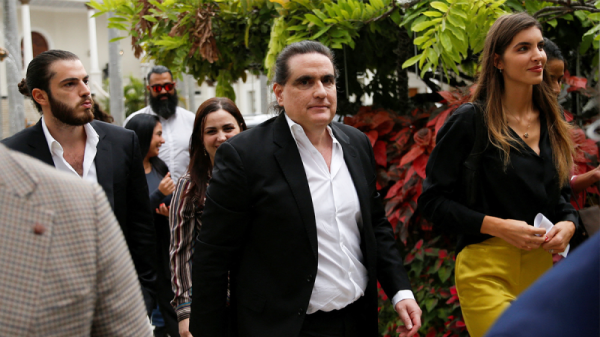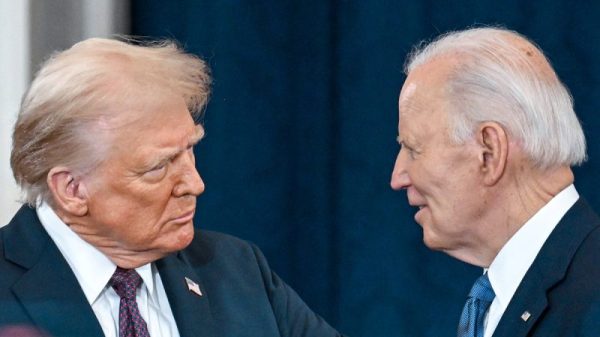Michigan will hold a Republican presidential primary on Tuesday, but that contest won’t award all the state’s delegates — the GOP also will hold a state convention days later to award the rest.
The hybrid plan for the nominating contest stems from a change made by the state’s Democratic-led legislature.
To accommodate President Biden’s plan to rearrange the Democratic Party’s nominating calendar, Michigan’s state legislature voted early last year to move the date of Michigan’s presidential primary from March to February.
Republicans in the legislature objected to the move because the earlier primary date would run afoul of the Republican National Committee’s rules and could cost them delegates at the national convention scheduled for July in Milwaukee.
Local and national party officials then negotiated a plan that would allow the Michigan GOP to award all its delegates despite the state’s new primary date.
“The Michigan Republican Party cut a deal with the RNC to come up with a hybrid system that allowed the general public to participate in a primary, which has been a strong tradition in Michigan and also hold a party convention on March 2 to select a majority of the delegates,” Saul Anuzis, a former Michigan GOP chairman, said in a statement to The Post.
Biden narrowly won Michigan in 2020, while Trump carried it four years earlier.
Of Michigan’s 55 Republican delegates, 16 will be awarded based on the result of the primary on Tuesday. The remaining 39 delegates will be allocated based on caucuses that will take place at the nominating convention on Saturday.
Michigan has open primaries, meaning voters can cast a ballot in a party’s primary even if they are not a member of that party. But only registered Republicans can vote at the caucuses.
“I suspect former president [Donald] Trump will win an overwhelming majority of delegates in Michigan,” Anuzis said of the hybrid contests.
Trump will appear on the Republican primary ballot, along with his last major challenger for the party’s nomination, former U.N. ambassador Nikki Haley. Also on the ballot will be Ryan Binkley, a wealthy pastor who has not garnered much support, and the names of several other candidates who previously suspended their campaigns.
President Biden will appear on the Democratic primary ballot, along with two other candidates: Rep. Dean Phillips (D-Minn.), who has struggled to gain traction with voters and last week laid off campaign staffers, and author Marianne Williamson, who ended her campaign earlier this month.
Turmoil within the Michigan Republican Party threatens to complicate the hybrid nominating contests even further — with a dispute over party leadership leading to the possibility of dual conventions unless a judge rules on the matter before Saturday.
Trump and the RNC recognized former congressman Pete Hoekstra as the leader of the Michigan GOP in mid-February after the party voted the previous month to oust its embattled chair, election denier Kristina Karamo.
But Karamo maintains that she remains “legally the chair” of the party. According to the Associated Press, Hoekstra plans to hold the state convention in Grand Rapids on Saturday, while Karamo and her supporters are scheduled to gather in Detroit on the same day.
The dispute has ended up in court, where a judge is expected to issue a decision this week.
Michigan will hold a Republican presidential primary on Tuesday, but that contest won’t award all the state’s delegates — the GOP also will hold a state convention days later to award the rest.
The hybrid plan for the nominating contest stems from a change made by the state’s Democratic-led legislature.
To accommodate President Biden’s plan to rearrange the Democratic Party’s nominating calendar, Michigan’s state legislature voted early last year to move the date of Michigan’s presidential primary from March to February.
Republicans in the legislature objected to the move because the earlier primary date would run afoul of the Republican National Committee’s rules and could cost them delegates at the national convention scheduled for July in Milwaukee.
Local and national party officials then negotiated a plan that would allow the Michigan GOP to award all its delegates despite the state’s new primary date.
“The Michigan Republican Party cut a deal with the RNC to come up with a hybrid system that allowed the general public to participate in a primary, which has been a strong tradition in Michigan and also hold a party convention on March 2 to select a majority of the delegates,” Saul Anuzis, a former Michigan GOP chairman, said in a statement to The Post.
Biden narrowly won Michigan in 2020, while Trump carried it four years earlier.
Of Michigan’s 55 Republican delegates, 16 will be awarded based on the result of the primary on Tuesday. The remaining 39 delegates will be allocated based on caucuses that will take place at the nominating convention on Saturday.
Michigan has open primaries, meaning voters can cast a ballot in a party’s primary even if they are not a member of that party. But only registered Republicans can vote at the caucuses.
“I suspect former president [Donald] Trump will win an overwhelming majority of delegates in Michigan,” Anuzis said of the hybrid contests.
Trump will appear on the Republican primary ballot, along with his last major challenger for the party’s nomination, former U.N. ambassador Nikki Haley. Also on the ballot will be Ryan Binkley, a wealthy pastor who has not garnered much support, and the names of several other candidates who previously suspended their campaigns.
President Biden will appear on the Democratic primary ballot, along with two other candidates: Rep. Dean Phillips (D-Minn.), who has struggled to gain traction with voters and last week laid off campaign staffers, and author Marianne Williamson, who ended her campaign earlier this month.
Turmoil within the Michigan Republican Party threatens to complicate the hybrid nominating contests even further — with a dispute over party leadership leading to the possibility of dual conventions unless a judge rules on the matter before Saturday.
Trump and the RNC recognized former congressman Pete Hoekstra as the leader of the Michigan GOP in mid-February after the party voted the previous month to oust its embattled chair, election denier Kristina Karamo.
But Karamo maintains that she remains “legally the chair” of the party. According to the Associated Press, Hoekstra plans to hold the state convention in Grand Rapids on Saturday, while Karamo and her supporters are scheduled to gather in Detroit on the same day.
The dispute has ended up in court, where a judge is expected to issue a decision this week.





















